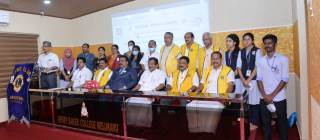HBC’s Resource Mobilization Policy serves to identify the sources of financial resources available for various programs, for the efficient utilization and management of funds, and to widen our resource base for the attainment of our long term and short term goals adhering to our strategic plan. This document identifies procedures for the efficient collection and utilization of funds.
- The College Staff Council shall monitor the optimal utilization of the funds for the smooth functioning of the Institution.
- The Diocesan Treasurer who is also the College Treasurer ex officio, in consultation with the Diocesan Executive Council shall be responsible for the management of funds contributed by HBC Management thereby ensuring transparency in the process.
- The income and expenditure of the college shall be in accordance with the Annual Budget prepared and approved by Staff Council.
- The Internal and External auditors shall be appointed by the manager of the college in consultation with the Diocesan Executive Council who does the verification of Receipts and Payment accounts.
- The management of all funds would be as per the recommendations of College Staff Council, Campus Planning and Building Committee (CPBC) and UGC Committee Coordinator (if applicable)
- Funds are provided to meet the infrastructure development of the institution while starting new programmes or centres
- The college management shall provide financial support to seminars/workshops/expert talks/Association activities/Faculty Development programmes, infrastructural development, construction and improvement of building, purchase of equipment, computers, furniture, office automation and library infrastructure, ICT enabled classrooms, etc.
- Adequate funds have been provided for Sports and Cultural activities of our students
- The college shall provide Scholarships and other complimentaries to deserving students
- Provident fund (PF) and Employee State Insurance (ESI) benefits shall be provided to HBC staff appointed by the Management
Financial Resources of our institution shall be:
- UGC Plan Development Grants for buildings, sophisticated instruments, purchase of books and journals, and for UG and PG education and research.
- PTA funds: Utilized for buying stationery, and training students for cultural activities and sports. A share is given to all departments for conducting various curricular, co-curricular and extracurricular activities of the college, expenses in connection with excellence day celebrations, Students’ medical aid, Free meals, Students’ Uniform and for cultural events.
- Fees from the Self financing course shall be used for the direct and overhead cost of the course.
- Endowments and Scholarships to students
- Grants from individuals, philanthropist
- Tuition fee and Hostel Fee collected from students
- College Development Fund (Development Grants from Management)
- Alumni Contributions
- Govt. Grants for NSS/WWS/ASAP, etc.
- University funding for College Union, College Magazine and for conducting exams
- KSCSTE fund given to colleges to carry out science and technology projects
- Financial assistance from MPs/MLAs
- Contribution from teachers used for common special needs of staff and students
- Fine collected from staff and students
Optimum utilization of space and resources to generate funds
- Renting out the College buildings, Students’ halls, etc. for conducting various competitive exams like PSC Exams, Bank Exams, community functions and sports activities like cricket/football matches, etc.
- College Auditorium rented for community functions on weekends and holidays.
- College ground rented out to private agencies after college hours
Funds generated through college activities:
- Proceeds from organic farming
- Proceeds from sale of LED bulbs
- Charity auction
- Tuition fee and Management grant is used for the infrastructure and academic activities. Government funds are optimally used for the purpose for which it has been sanctioned. Income generated from hostel fee is used for the intended purpose. Transparency and accountability are ensured by conducting an annual audit of the financial transactions recorded in books of accounts and documents. Financial support provided by the government agencies are audited by the respective Government Departments.
Financial Audit of all Funds: HBC’s five levels of audit of accounts are:
- Audit by External Chartered Accountant: The accounts are audited by a privately practicing Chartered Account after the closure of every financial year. The audit report issued by the auditor with utilization certificate and all the accounts which have been ratified are submitted before the Staff Council of the college and Diocesan Executive Council.
- Audit by Directorate of Collegiate Education: The Directorate of Collegiate Education, Trivandrum through the Audit Team of Deputy Directorate of Collegiate Education, Kottayam conducts periodical audit of books and accounts of the Institution every year. After hearing the clarifications and corrections, the final accounts are settled.
- Audit by Accountant General, Kerala: The Accountants General, Kerala also conducts their periodic audit of the Institution. Their suggestions and directions are also incorporated for the utilization of the funds.
- Audit of HBC Co-operative Society by DCA: The Auditor of Directorate of Co-operative Audit (DCA), comes under Assistant Registrar (Co-operation), Pala conducts Audit of “The Melukavu HBC Co-operative Society Ltd. No. K 916” after the closure of every financial year. The latest audited financial statements are that of the period 2019-2020.
- Internal Audit: Internal Auditor has the responsibility to examine the effectiveness of all levels of management in their stewardship of College resources in compliance with established plans, policies, and procedures, and sound management approaches. The Internal Auditor is appointed by the manager of the college in consultation with the Diocesan Executive Council. With commitment to integrity and accountability, internal auditing provides value to the Head of the Institution, College Staff Council, and Governing Body of the college and the Diocesan Executive Council as an objective source of independent advice.
Audit of Grants and funds sanctioned by the HBC Management
All the amounts received (and utilized) from the management are audited internally as well as externally. On behalf of the Management, all daily transactions are verified by the Principal of the college.
The annual internal audit of HBC accounts is done by the Auditor appointed by the Manager, East Kerala Diocese, in consultation with Diocesan Executive Council.
Audit Review Meeting and Settling Audit Objections
At the closure of every audit listed above, there would be an Audit Review Meeting to discuss the operational aspects of audit elements. Audit Review Meeting is an interaction between the HBC Staff and the Audit Team discussing the audit elements and the pros and cons of the accounts audited and the changes to be incorporated in the subsequent periods. After this meeting steps will be taken for settling audit objections if any.



